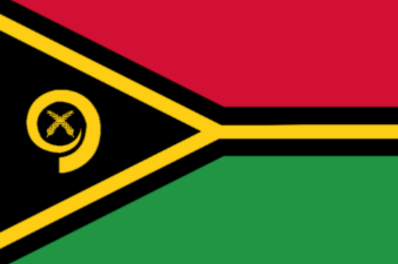World
Vanuatu : Long God Yumi Stanap

Vanuatu is a small island nation located in the South Pacific Ocean. It is an archipelago consisting of over 80 islands, with a total population of approximately 300,000 people. The history of Vanuatu is rich and complex, with influences from various cultures and nations. This article will provide an overview of the major events and milestones in the history of Vanuatu.
Pre-colonial era
The islands that make up Vanuatu were first settled around 3,000 years ago by a group of Austronesian-speaking people. They were skilled navigators and fishermen, and they built complex societies with sophisticated agricultural systems. The traditional way of life in Vanuatu was based on subsistence farming, hunting, and fishing. Each island had its own culture and language, with over 100 distinct languages spoken throughout the archipelago.
The first Europeans to arrive in Vanuatu were the Spanish, who landed on the island of Espiritu Santo in the early 16th century. However, it was not until the late 18th century that European exploration and settlement began in earnest.
Colonial era
In the late 18th century, French and British explorers began to visit Vanuatu. The islands were named the New Hebrides by British explorer James Cook in 1774, and they became a center of European commercial activity in the region.
In 1887, a joint British-French naval commission was established to resolve territorial disputes between the two nations in the New Hebrides. The commission declared the islands a “Condominium” under the joint authority of France and Britain. The Condominium was unique in that it was the only territory in the world to be governed jointly by two colonial powers.
During the colonial era, the traditional way of life in Vanuatu was disrupted by the arrival of European traders, missionaries, and settlers. Christianity was introduced to the islands, and many traditional practices and beliefs were replaced by European values. The economy of Vanuatu became increasingly dependent on cash crops, such as copra, coffee, and cocoa, which were grown on plantations owned by European settlers.
World War II
During World War II, the islands of Vanuatu played a significant role as a military base for the Allied powers. The Americans built airfields on the islands of Efate, Espiritu Santo, and Tanna, which were used to launch attacks on Japanese-held territories in the Pacific. The war brought significant changes to Vanuatu, including the introduction of modern infrastructure and the establishment of a more diverse economy.
Independence and modern era
Vanuatu gained independence from the Condominium in 1980, becoming the first nation in the Pacific to achieve independence. The country’s first prime minister was Walter Lini, a leading figure in the Vanua’aku Pati, a political party that had been instrumental in the struggle for independence.
Since independence, Vanuatu has faced a number of challenges, including political instability, economic dependence on foreign aid and tourism, and natural disasters. In 2015, the country was hit by a category 5 cyclone, Cyclone Pam, which caused extensive damage and loss of life.
Despite these challenges, Vanuatu has a rich cultural heritage and a unique way of life. The traditional practices and beliefs of the ni-Vanuatu (the people of Vanuatu) continue to be an important part of the country’s identity, and the country is home to a vibrant arts and crafts scene, with many traditional handicrafts still produced using age-old techniques.
Conclusion
The history of Vanuatu is a complex and multifaceted one, shaped by the interactions between various cultures and nations. From its pre-colonial origins to its present
Vanuatu, a small archipelago nation located in the South Pacific, is often hailed for its cultural diversity and the way in which its people have successfully maintained their traditional way of life. However, while the country is often held up as an example of multiculturalism and inclusivity, it is important to acknowledge that racism and discrimination are still very real issues in Vanuatu.
Historically, Vanuatu has been a colonial outpost, first under the control of the British and then the French. The colonial era brought with it a legacy of racism and discrimination that has persisted to this day. While Vanuatu gained independence from both colonial powers in 1980, the country’s ethnic makeup is still heavily influenced by its colonial past.
The country’s population is divided into three main groups: Ni-Vanuatu (indigenous Melanesians), French and British expatriates, and Asians (primarily Chinese and Vietnamese). While these groups are all present in Vanuatu, they do not always live and work together harmoniously.
One of the most obvious examples of racism in Vanuatu is the way in which some Ni-Vanuatu view Asians. There is a perception among some Ni-Vanuatu that Asians are “taking over” the country, particularly in the realm of business. There have been instances of discrimination against Asians, with some Ni-Vanuatu refusing to do business with them or even outright attacking them.
Another form of racism that is present in Vanuatu is the way in which some Ni-Vanuatu view other Ni-Vanuatu from different islands. There are 83 islands that make up Vanuatu, and each island has its own unique culture and identity. However, this has led to a sense of tribalism among some Ni-Vanuatu, with people from one island viewing people from another island as inferior or unworthy.
It is worth noting that while racism is present in Vanuatu, it is not a universal experience for all people in the country. Many Ni-Vanuatu are open and welcoming to people from different ethnic backgrounds, and there are expatriates and Asians who have integrated well into the country’s society.
However, it is important to acknowledge that racism does exist in Vanuatu and that it is a problem that needs to be addressed. The government of Vanuatu has taken some steps to combat racism, including enshrining the right to non-discrimination in the country’s constitution and creating the National Council of Chiefs to promote cultural understanding and cooperation.












You must be logged in to post a comment Login